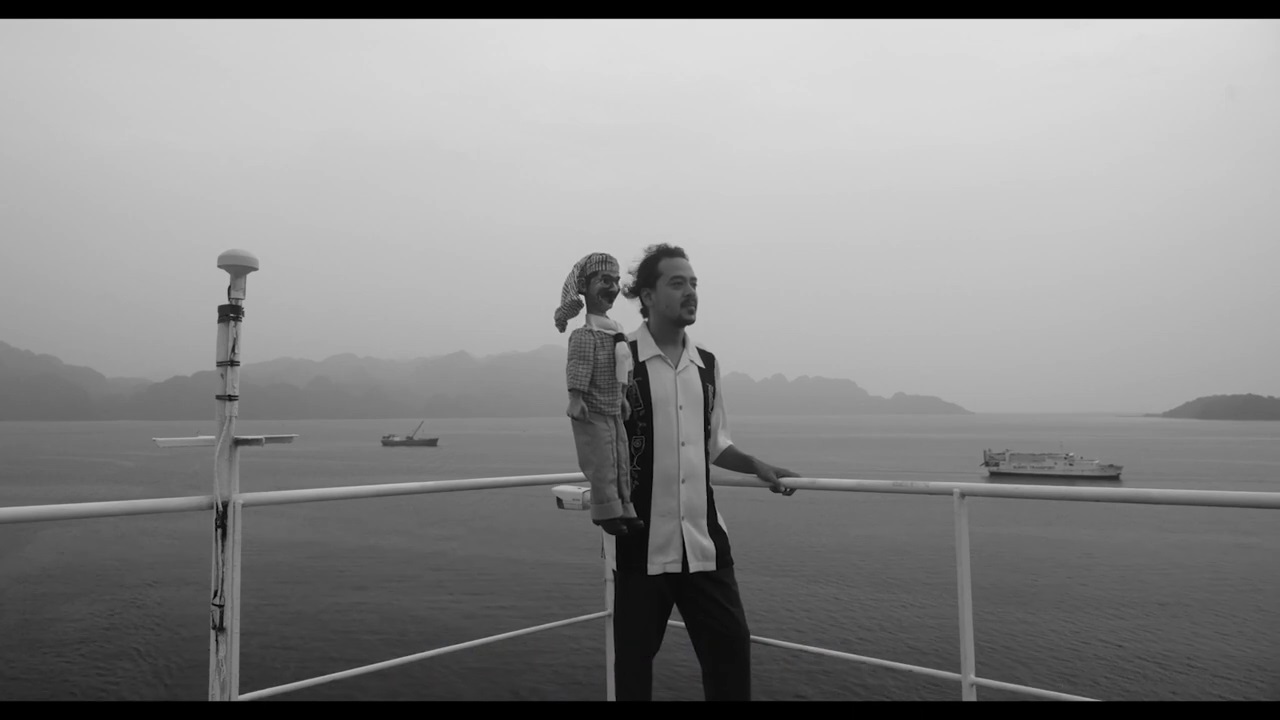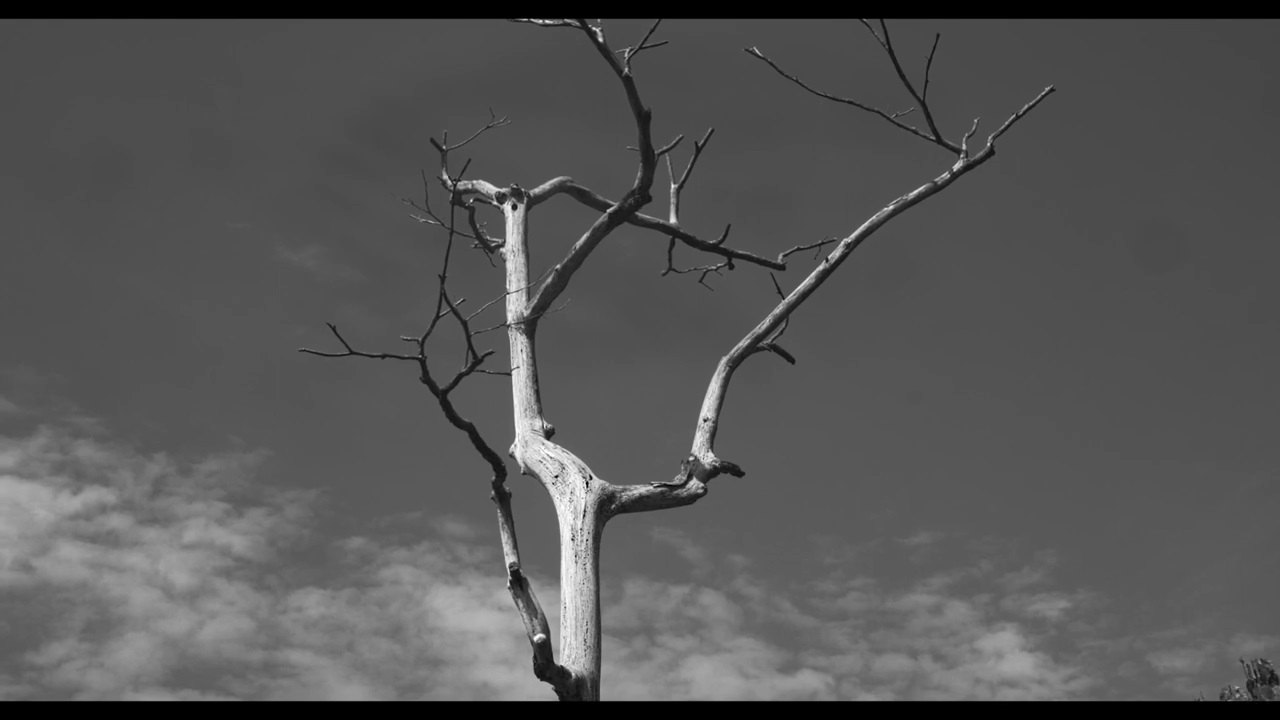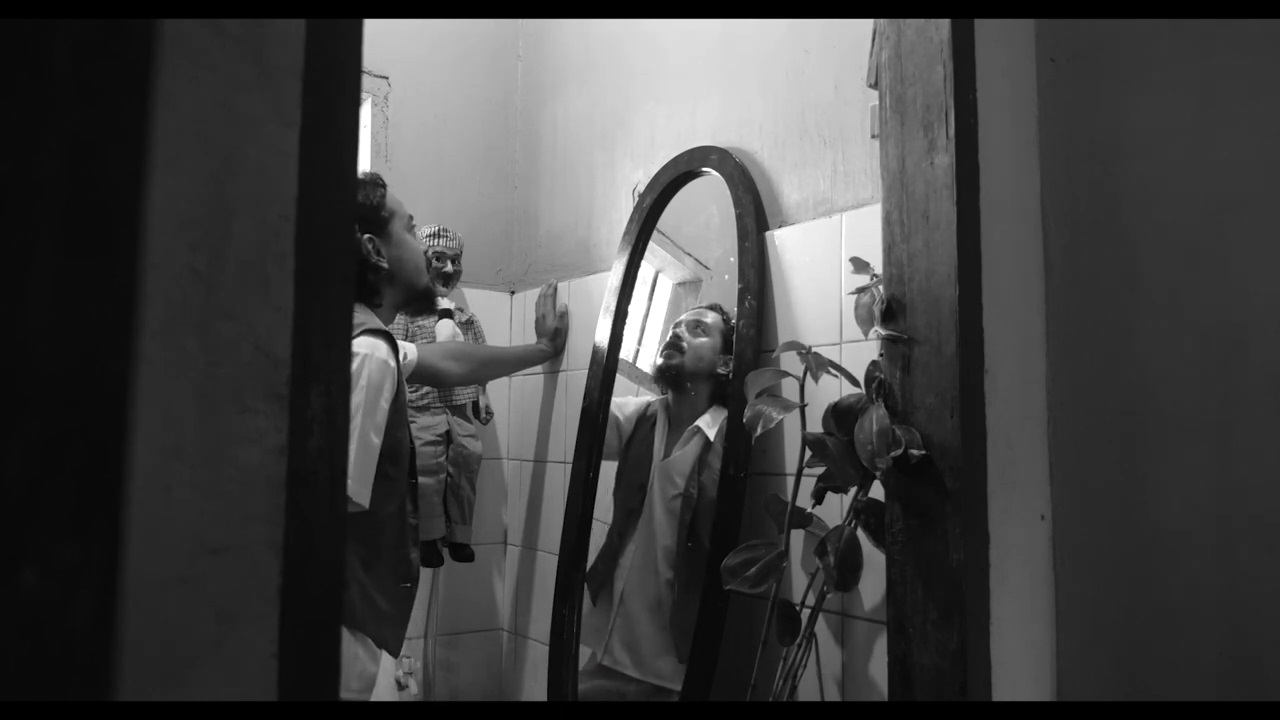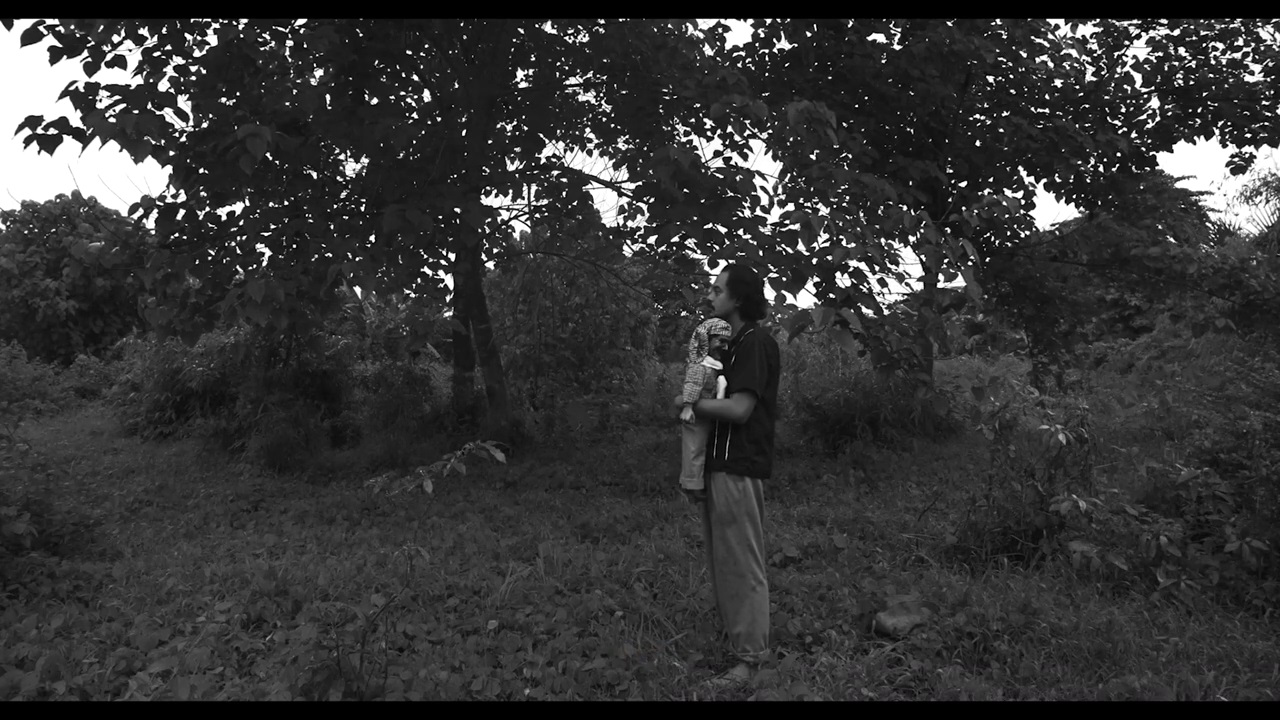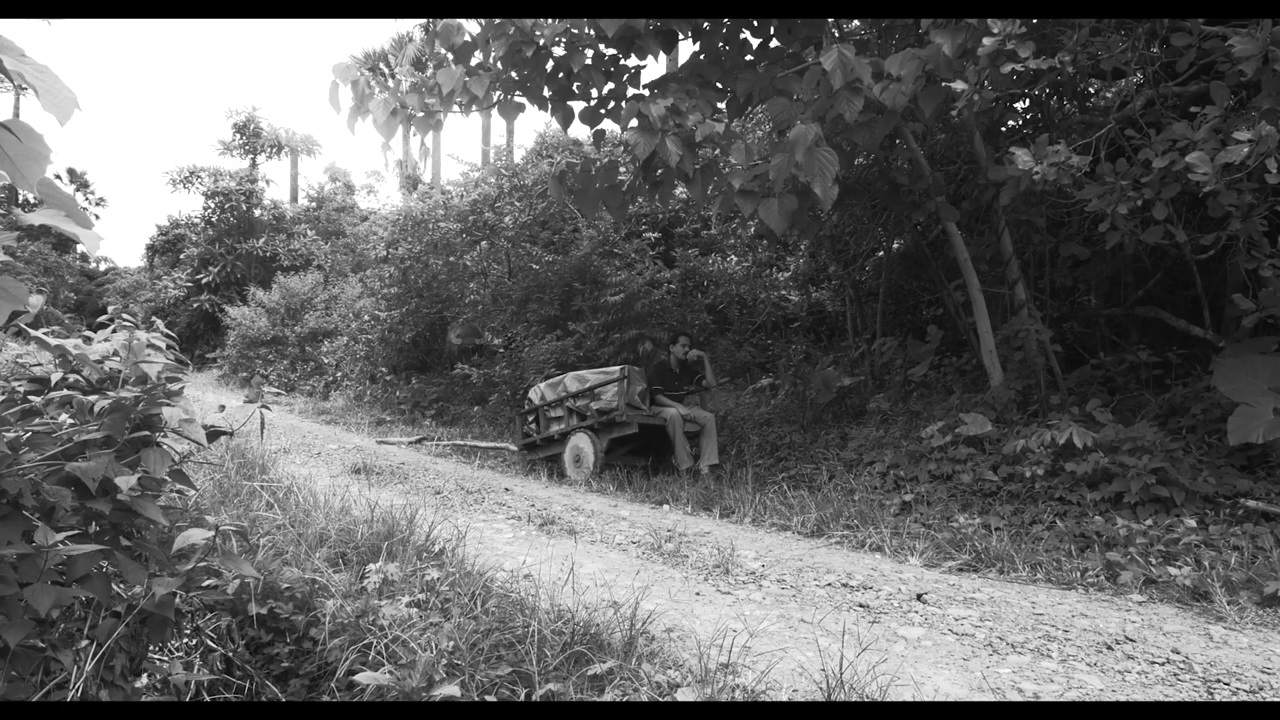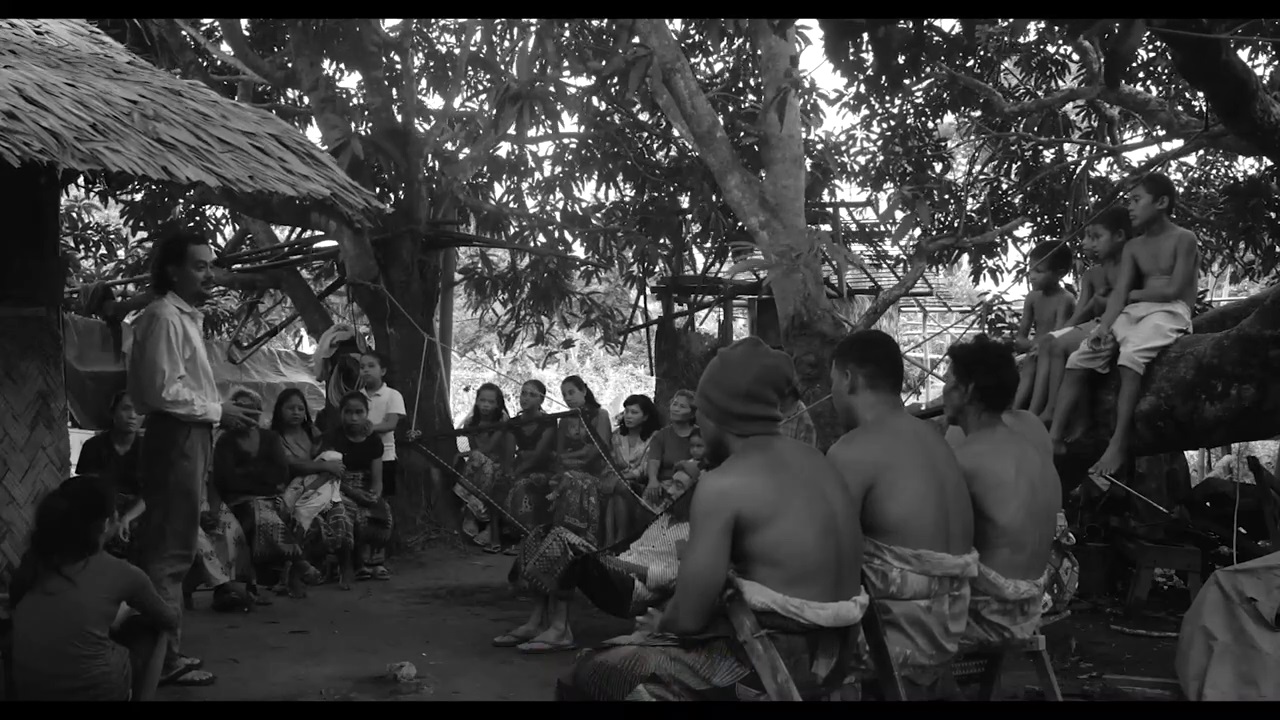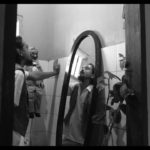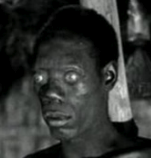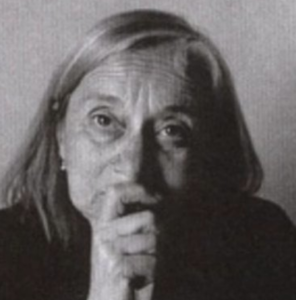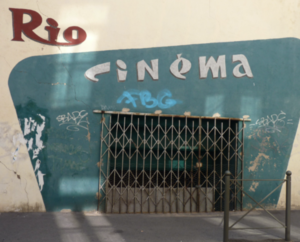Lav Diaz (2022)
In the Name of the Father
The late-summer sun shines bright on the Laguna, the seagulls float half-asleep on the murky water among the uneatable remains of yesterday’s parties. I am not a fan of the smell of fish and gasoline so early in the morning, but I must admit that the daybreak is as pretty and peaceful as it can be in Italy’s most magnificent tourist trap. Another perfect day, Hell is on Earth: in the midst of wars that began long before we were born and will continue long after our death, as the false prophets vomit propaganda 24/7 and unleash what Colonel Kurtz calls “the horror”, I sit down with Lav Diaz for a long coffee and a long talk about his film History of Ha (2021). As usual, Diaz not only zooms in on the open wounds of the Philippine past, but also puts his fingers into them to let the pus ooze out on the present.
Débordements: History of Ha is set in 1957-1958. Tell me about the 1950s Zeitgeist in the Philippines.
Lav Diaz: The late 1940s and most of the 1950s were a period of hope for the country: after centuries of Spanish domination [1521-1898], after decades of American rule [1898-1946], after the Japanese occupation during World War Two [1942-1945], at long last the Filipinos could start to look at life in a more constructive way. Indeed, in the late 1940s and early 1950s, there was much talk about the reconstruction, the regeneration, the rebirth of the newly independent Philippines. Within this Zeitgeist, Ramon Magsaysay was a prominent military and political figure: during World War Two he commanded guerrilla groups that helped to free the Philippines from the Japanese invaders, and in the early 1950s he crushed the Huk rebellion that was trying to bring about a Communist revolution in the country. As a result, Magsaysay was hugely popular among the Filipino masses, who saw him as a strong, fearless freedom-fighter and national hero, while the CIA unconditionally supported him due to his anti-Communism. Naturally, when he ran for president at the 1953 presidential election, he won by a landslide. This ascent to power came to an abrupt end when president Magsaysay died in a plane crash on 17 March 1957.
Débordements: That’s when History of Ha begins, as a radio speaker reads the news of Magsaysay’s death…
LD: Yes, on 17 March 1957 Magsaysay’s plane crashed and, when the news spread, the Filipino masses went from hope to disorientation: “Who is going to provide a future for the country now that our liberator and strong leader is dead?”. You know, during the 1953 presidential campaign, Magsaysay was able to conquer the psyche of the Filipinos, he really set the bar for all the politicians to come. Not coincidentally, when he ran for president in 1965, Ferdinand Marcos copied Magsaysay by presenting himself as a liberator and saying to the Filipino masses things like “I am your hope for the future”. Marcos even commissioned a film, Iginuhit ng Tadhana [“Written by Fate“] (1965), a biopic full of propaganda lies. In it, Marcos annihilates a whole Japanese battalion with a gun that never runs out of bullets, he gets decorated by the US Army, and so on. Marcos had himself portrayed like a World-War-Two superhero and in 1965 he won the presidential election…
Débordements: Do you mean that Magsaysay set the blueprint for aspiring presidents to follow?
LD: In a way, yes. Magsaysay embodied the need for a liberator and strong leader that the Filipino masses felt in the post-war. After Magsaysay, this need led to the election of many corrupt, self-serving politicians who adopted the strong-man persona and promised freedom and safety for all in a new society: Ferdinand Marcos, Joseph Estrada, Rodrigo Duterte and Ferdinand Marcos’s son Bongbong, just to name those who eventually made it to Malacañang Palace [the Philippine presidency].
Débordements: Music was essential to Magsaysay’s ascent to presidency, too.
LD: Yes, as I explain in History of Ha, the song Mambo Magsaysay was used to instill into the Filipino masses the idea that strong man Magsaysay was the only hope for a better future. Ferdinand Marcos did the same with the song Bagong Lipunan [“New Society“] in the early 1970s, as he was plotting to subject the whole country to his brutal dictatorship [1972-1986]. Bongbong Marcos also used an updated version of Bagong Lipunan in the 2022 presidential campaign. Political anthems are always big hooks for the masses’ psyche to bite. These “jingles” (as they used to be called in my youth) work especially well when they are played over and over, and when they are associated to a strong-man persona. It is like a religious creed, really: you constantly repeat a prayer to this or that all-powerful entity, and it becomes a mantra for liberation, it becomes so fixated in your psyche, until your rationality is completely destroyed… together with your freedom.
Débordements: As you mentioned, the CIA strongly supported Magsaysay’s political career. As a president, was he pro-America?
LD: In the first year of his presidency he was really pro-America but, according to political pundits, he grew very uncomfortable with the intrusions of CIA advisors as time went by. Apparently, all his decisions were being checked, approved or vetoed by the USA. On certain occasions, Magsaysay openly criticized the paternalism and over-protectiveness of the Americans. Then he died, so of course there were all sorts of myths and legends about the plane crash as a premeditated political assassination. Lots of conspiracy theories, as you can imagine, even to this day: “The CIA actually killed Magsaysay!”, and things like that…
Débordements: In your opinion, did Magsaysay live up to the expectations of the Filipino masses during his short term as a president?
LD: I think so. His presidency was cut short after three years or so, but there are proofs that he was trying his best to be progressive and constructive, reforming the country in order to improve the life of millions of destitute people. Moreover, there is no record of corruption in his administration, and this is a very important thing: political corruption was, and still is, one of the biggest problems in the Philippines.
Débordements: The protagonist of History of Ha is Hernando Alamada (John Lloyd Cruz), a famous vaudeville artist who used to be a Socialist cadre before the Huk rebellion was crushed…
LD: Yeah, Hernando used to be an ideologue of the revolutionary movement but, by 1957, he has become very disillusioned and bitter. On the one hand, he knows that the system – based as it is on feudal exploitation – isn’t working for the people; on the other hand, during his struggle as a Socialist cadre, he has realized that Marxism simply isn’t catching on, the Filipino masses aren’t embracing this revolutionary ideology that seeks to change the political and socio-economic status quo. Of course, I added a love story that partially explains Hernando’s disillusionment and bitterness: Rosetta, the peasant woman he loves, is forced to marry a feudal lord to pay for her father’s debts… I didn’t want Hernando to be a 100% political animal, I wanted him to be an all-round human being, a mix of intellect and emotions.
Débordements: Do you ever get disillusioned and bitter yourself?
LD: We come from six years of Duterte’s bloody War on Drugs, and now we have another Marcos as president of the Philippines. Not to mention the terrible news coming from all over the world every single day ever since I can remember – authoritarian regimes everywhere, capitalism destroying everything… How can one not get disillusioned and bitter? In such a situation, it is easy to turn your back and be a nihilist, a negative guy, a selfish hedonist: “Everything is fine as long as I can provide for myself and my family! Fuck this country, fuck this world, I will just sit back and enjoy my coffee!”. I feel bad every day from the minute I wake up, but I think that feeling bad and giving up is too easy. The regenerative way of living has been with me since I was a kid, because my parents spent their whole life with the poorest and most forsaken indigenous people in order to promote education, bring about change and improve the country. From my parents, I inherited this kind of mentality: as a human being, I must be responsible and do my best to help out and make things better. What can I do? I can make movies, so I will continue to make movies until I get dementia. [Laughter] What can you do? You can write, so turn all the bad feelings into creative energy, follow the muses of your inspiration and publish as many books as you can.
Débordements: “Because of sadness, there is music… Because of sadness, there is poetry… Because of sadness, there is cinema…”.
LD: That’s my film Melancholia (2008), yeah, now people can skip the seven plus hours. [Laughter]
Débordements: Hernando dreams of being a teacher, a farmer and a family man. Were you thinking of your father while creating the main character of History of Ha ?
LD: Very much so, very much so, I patterned Hernando after my father. Like Hernando, my father was an intellectual, a hardcore Socialist ideologue. Like Hernando, my father learned from experience that he had to let go of theory, focus on the very practical aspects, and teach and teach and teach. Not only my father taught the indigenous people how to read, write and count, he also taught them the basic hygiene practices, like how to properly wash hands, how to keep a clean backyard, how to build a toilet, and so on. In the ending of History of Ha, Hernando and the tribesmen dig a toilet in the forest, that’s exactly what my father used to do. As a young graduate, my father was all about theoretical discussions but, as the years passed, he became very pragmatic. He used to tell me: “Make a small improvement in people’s life today and it will have a big impact eventually! A proper toilet, that’s a good start!”.
Débordements: Did your father abandon the revolutionary movement like Hernando?
LD: The ideology of the revolutionary movement inevitably led to armed struggle. However, my father was against violence, so he couldn’t join the movement as an insider, as an active member. Active members must kill people: they are at war with the Armed Forces of the Philippines, the government must be overthrown, it is a revolution. My father couldn’t bring himself to kill people. I remember that, when I was a child, he couldn’t even kill our farm animals: we nurtured cows, carabaos, goats and chickens, but he never killed any of these animals to provide us for food. He would rather sell them alive and use the money to buy meat at the market. He was really against violence, he couldn’t shed blood. He even had problems cutting trees… He didn’t want to kill any living being.
Débordements: Where does the idea of making Hernando a vaudeville artist come from?
LD: The Filipino version of vaudeville – bodabil – was at the height of its popularity in the 1940s and 1950s. Bodabil was especially popular during the Japanese occupation, when it was used to attack the invaders, for example through parody and satire.
Débordements: Do you think that it is possible for cinema to be hugely popular and also convey a political message?
LD: Like any other form of expression, like any other medium, cinema is just a tool. It is up to you to decide what you want to do with it.
Débordements: Sometimes, if you really want to be popular, if you really want your work to reach the masses, compromise is needed. Big producers and big distributors regularly ask you to make a two-hour movie in color, don’t they?
Lav: If you are a politician, compromise is important. Compromise is the key, always, if you work around politics, because you have to find a way to make everybody happy in the end. But in the arts it is different: you don’t need compromise in the arts. Once you allow compromise into your creative process, you end up destroying your own perspective and your work becomes a fraud. Be careful!
Débordements: Why did you decide to make Hernando a ventriloquist, specifically?
LD: History of Ha is a film about a guy who is split between two perspectives: on the one hand, he wants to be part of a greater movement, which is the Socialist movement, and solve the issues of his country; on the other hand, he has many personal problems to deal with – love issues, family issues, career issues… In order to see things clearly and make important decisions about his life, Hernando needs to create a “buffer”, a “second persona” that allows him to have a discourse with himself and within himself. Hence the use of the dummy, the puppet Ha.
Débordements: Talking about confronting oneself, in History of Ha there are two mirror scenes: the first one as Hernando goes to the barber shop, the second one as Hernando hangs out in the backstage getting ready for a public performance…
LD: Confronting your own reflection in the mirror is very hard, you know. Do you really want to look at yourself in the mirror? Do you really want to talk with yourself face to face, eye to eye? Have you ever tried it? It is one of the hardest things to do! So John Lloyd and I had a discussion about it. I told him: “It is so difficult for me to look at myself in the mirror and talk with myself! It is so hard to lay bare my own soul! I would rather talk with myself in my mind, without having to look at myself in the eyes…”. So John Lloyd started to talk with himself in front of the mirror by using the dummy. With the dummy, the confrontation was a little bit easier…
Débordements: In your films, artists usually go crazy and ultimately destroy themselves. I am thinking of Benjamin Agusan (Roeder Camañag) in Death in the Land of Encantos (2007) and Julian Tomas (Perry Dizon) in Melancholia. This isn’t the case with Hernando in History of Ha.
LD: That’s because of Hernando’s ideology. Most of the times, artists are too focused on themselves, their medium, their artistic research, and they lose sight of everything else, they get lost, they lose their mind, they lose their life… But, thanks to his Socialist background, Hernando doesn’t go astray. On the contrary, he becomes a very practical person, very down-to-earth, altruistic and constructive rather than self-centered and self-destructive. Hernando is able to find his foothold in real life because of his progressive ideology that pushes him to help other people.
Débordements: History of Ha is a road movie…
LD: With a carabao instead of a big car or motorbike, yeah. [Laughter]
Débordements: The disillusioned revolutionary and vaudeville star Hernando crosses the immensity of the Filipino landscape with his cart and carabao, like poor peasant Heremias (Ronnie Lazaro) does in Heremias: Book One – The Legend of the Lizard Princess (2006).
LD: Heremias and Hernando are travelling, they are journeying, they are going through these rivers of uncertainties… and, at a certain point, you don’t know if they are going to get hold of their footing again. Hernando succeeds in the end, he doesn’t get carried away by the current. He becomes a very responsible human being.
Débordements: Compared to the ending of Heremias: Book One – The Legend of the Lizard Princess, in which we leave the title-character wandering aimlessly in search for help that never comes (from neither God nor man), the ending of History of Ha seems more hopeful, as we have the certainty that Hernando has found his way in life, becoming a teacher and trying to help the indigenous people.
LD: Well, nothing is certain in life so… I don’t know, maybe Hernando will be one of the thousands of activists red-tagged and killed during the Marcos regime throughout the 1970s and the early 1980s… The certainty is that Hernando is doing his best to educate the poorest, most forsaken Filipinos. What he says at the end of the movie in his letter to Rosetta is very important: “OK, the system is failing, but I refuse to be part of this failure! I will try to educate the tribespeople and make their life better… I will do it on my own terms and I will be part of humanity’s success!”.
Débordements: The road-movie genre provides you with an open structure that perfectly fits your “organic” way of working…
LD: Drafting a storyline, finding a location and immersing myself in it, writing the movie as I am shooting it: this is the way I work… I discover the movie as I go… You know, I love the images of roads opening in front of me, especially if they are rough roads. Rough roads can lead to finer roads at some point. Yeah, I believe in that.
Débordements: In History of Ha, all the roads lead to Diwata Island: destitute people from all over the Philippines are trying to reach this island where, according to rumors, gold has been struck. Why did you choose the name “Diwata”?
LD: “Diwata” means “fairy” in Malay. A beautiful young woman is called diwata nowadays, but the term originally comes from the mythology of our culture, and it designates the beautiful fairies who dwell in beautiful gardens, in beautiful forests, or even in our dreams. So Diwata Island is an island of beauty and hope, a place that gives out things, a place that provides for the people. The idea of diwata is central in the psyche of the Filipino masses: they are so poor, so neglected, so helpless, they are all hoping to find a fairy that provides for them, somewhere, someday, somehow. Many, many people in the Philippines are forced to emigrate abroad to make a living, they say things like “Italy is diwata, there is hope there that I can provide for my family!”. In History of Ha, Diwata Island is a place that attracts people with the promise of providing them with gold. Gold is hope, gold is the reason why aging prostitute Dahlia (Dolly de Leon), teenage peasant Joselito (Jonathan Francisco) and all the others want to reach Diwata Island so badly. Only Hernando opposes the idea of diwata because it creates illusions and delusions. That’s his Socialist perspective: “Destroy illusions and delusions, be real! We Filipinos have this long, long history of violence and exploitation, be dialectical! Don’t be fooled by yet another false myth, by yet another false hope!”.
Débordements: Actually, the fact that gold was struck in Diwata Island might just be fake news…
LD: It definitely is fake news! It is a rumor created by the capitalists, by the feudal lords who want to do business in the area and exploit the Filipino people even more.
Débordements: The feudal lord controlling access to Diwata Island is Among Kuyang (Teroy Guzman). He acts a bit crazy but he is no fool…
LD: Yeah, Among Kuyang is very intelligent. The people believe in mythology? Among Kuyang uses the idea of diwata. The people believe in nationalism? Among Kuyang presents himself as a heir to “the original Filipino”, Lapu-Lapu, the great hero and liberator who fought the Spanish colonizers as they tried to set foot on the islands many centuries ago. The people believe in Christianity? Among Kuyang presents himself as a God-fearing person. The people believe in Magsaysay? Among Kuyang says that he and Magsaysay are best friends. The power of myth-making is very apparent to Among Kuyang: “I can attach myself to the mythologies of this culture, and the people will believe me!”. Feudalism is more destructive when it is managed by intelligent people, because it doesn’t control you by brute force only… it also manipulates your mind.
Débordements: Among Kuyang even plays the role of the prophet…
LD: He predicts that in the future (the film is set in the late 1950s) a leader from the North will come, then a leader from the South will come. Liars and opportunists resort to prophecy as a tool to make people believe, and in this Among Kuyang is no different than a manghuhula [fortune teller] using the cheapest tricks in the book. For one thing, his prophecy is very vague: a president from the North and a president from the South will come… Well, these things are very likely to happen at some point in the future, you don’t need prophetic powers to foresee such events! Secondly, there is the issue of repetition: every prophecy is bound to become true someday if it is repeated over and over, if people cling on to it and really want to believe. History of Ha is a warning: “Beware! Guys like Among Kuyang ruled, are ruling and will rule the country!”. Ferdinand Marcos, the opportunistic liar and supreme manipulator, came from Ilocos Norte [from the North]. Rodrigo Duterte, who has been waging war against his fellow Filipinos for the past six years, came from Davao [from the South]. Now we have Bongbong Marcos, the son of Ferdinand Marcos, as a president. Will Sara Duterte, the daughter of Rodrigo Duterte, be Bongbong Marcos’s successor? She currently is vice president…
Débordements: I have more and more the feeling that cinema is always “too late”: a film can deplore that bad things happened, but somehow it doesn’t seem to be able to prevent bad things from happening. You currently are here in Venice, you are presenting at the Venice Film Festival your new film When the Waves Are Gone (2022), which is an indictment of Duterte’s War-on-Drugs-related extrajudicial massacres from 2016 to 2022, and yet Duterte has just retired, we have president Bongbong Marcos now and the specter of another Marcos dictatorship is looming over us. How can we make cinema more “timely” and therefore more effective as a “prevention tool”?
LD: That’s the big question, man! In my view, the idea that cinema is always “too late” and somewhat “powerless” comes from the fact that we can’t reach the masses, I mean the mass population of the Earth. Cinema is still confined to very few people. I am not talking about Hollywood movies: the big business of course manages to reach millions and millions of spectators. I am talking about greater cinema: the cinema that deals with the struggle of humanity simply doesn’t reach a lot of people. Maybe cinema wouldn’t be “too late” if a film like From What Is Before (2014) could get a Marvel-movie kind of release. But how do you do that?
Débordements: Do you think that, with a better distribution, your cinema can have more impact on society?
LD: Yes, I think so, but we can’t use the capitalist tool. Distribution is still the capitalist tool. One day in our so-called Internet Age maybe there will be a democratization of the streaming services, and maybe the masses will have better and less expensive tools to access cinema… Then, maybe, cinema won’t be “too late” anymore. If we can reach, say, 75% of the population of the Earth, cinema won’t be “too late” anymore because we will really be able to communicate with the people, affect their perspectives and bring about change. We have great cinema since when? The problem is that great cinema only reaches a small number of spectators. Maybe 10% of the masses? Nah, not even that. Only big Hollywood movies can reach 50% or 60% of the masses.
Débordements: Have you been trying different distribution strategies other than the usual festival screenings plus brief commercial run?
LD: We are going to stream From What Is Before for a week for free on YouTube, because September 21 is coming, it is the anniversary of the proclamation of Martial Law [21 September 1972], the beginning of Ferdinand Marcos’s dictatorship. How many people will be reached? In the past years we streamed A Lullaby to the Sorrowful Mystery (2016) for three days for free and it reached 30,000 people. That’s great, but there are 110 million Filipinos out there! [Laughter] Today we have all these entertainment sanctuaries, from YouTube to Pornhub, bringing images and sounds directly into people’s homes… But if you do serious work, you have to be patient: popcorn is just everywhere, so you have to wait for people to engage with your serious work, one person at a time… I get impatient too, but there is no easy fix…
Débordements: We talked about cinema’s being “too late”, but in History of Ha there is a rant against Duterte that, uttered in the Philippines of 1957-1958, is clearly “too soon”. Why did you decide to include this anachronism?
LD: I never name Duterte in the satirical poem that Hernando recites in front of the crowd at the festival organized by Among Kuyang but, yeah, it is quite clear that I am referring to Duterte and his cronies. I included this anti-Duterte rant in History of Ha because I wanted to show that a period film can be relevant to the present, that a period film isn’t just about history but also about the now. The problems of the Filipinos denounced by José Rizal in the late nineteenth century are the same problems denounced by Hernando in the Magsaysay years, and the problems of the Magsaysay years are the same problems of today: from the haciendas of the colonial period to the Marcoses and the Dutertes, the country is still run by a feudal, dysfunctional system… and it keeps getting worse! So I didn’t want the spectators to watch History of Ha and say: “This is what happened in the 1950s, that’s over and done with…”. No, it is still happening now! Some spectators noticed a cardboard box in Hernando’s cart, from a brand of instant noodles that is very popular today but didn’t exist back in the 1950s: it is another intentional anachronism on my part.
Débordements: While Hernando is performing his rant against Duterte, Among Kuyang barges in on the show basically saying: “Enough of that! Let’s give people some escapism!”…
LD: As I said, Among Kuyang is very intelligent. He doesn’t want the masses to come into contact with progressive thoughts. He is far ahead of everybody, that’s why he is “Among Kuyang”: “Among” is the Malay word for “God”, and “Kuyang” is the Malay word for “big brother”.
Débordements: Another important character name in History of Ha is “Ernesto Guevara”. In your film, Ernesto Guevara (Earl Ignacio) is an undercover Huk guerrilla who infiltrates Among Kuyang’s turf and assassinates him.
LD: The character is a tribute to “El Che”.
Débordements: We always come to the point where violence is needed: Among Kuyang must be destroyed.
LD: The character of Ernesto in History of Ha is a symbol for that. Among Kuyang must be eliminated, otherwise he will rule forever. But how do you do that? Only through the supreme sacrifice, the sacrifice of one’s own life.
Débordements: Ernesto eliminates Among Kuyang in a suicidal attack – a sudden burst of violence that kills many innocent bystanders as well…
LD: The so-called collateral damage is the saddest part, especially if it involves innocent people, like in History of Ha. That’s the harsh reality that revolutionaries have to face: if you do a revolution, there will always be collateral damage. The death of the innocents is a cathartic moment in the film, because in front of the dead bodies of the poor kids Hernando is finally able to cry, and his emotions shift from his failed relationship with Rosetta to his fellow Filipinos oppressed by this failure of a system. Now Hernando can let go of his personal burden, move forward, and do real things like being a teacher and working hard to construct a better country. He hasn’t forgotten Rosetta – he never will, probably. He still loves her, but he is much more mature now. His intellect has acknowledged his emotions, and his emotions have acknowledged his intellect, so at the end of the movie Hernando writes a letter to Rosetta about this new majestic responsibility: he doesn’t write about his love for her anymore, he writes about his love for humanity now.
Débordements: Rosetta can never be seen in the movie. Why?
LD: Originally, Rosetta was to be seen at the beginning of the film, but then I decided not to show her: Hernando’s obsession – the source of his pain – is the invisible Rosetta, so it is more effective that she exists only as a voice reading the letters.
Débordements: After Hernando’s catharsis and decision to become a teacher, he sets his “alter ego” Ha free by placing the puppet on a makeshift raft and pushing it adrift in the sea. Actually, I was expecting Hernando to burn Ha…
LD: The original ending of the film was this: Ha sets sail; a poor fisherman casts his net in the high seas; Ha is caught in the net; the poor fisherman takes Ha to his decrepit hut and gives it to his child; the child plays with Ha. However, I eventually decided not to shoot this ending.
Débordements: How come?
LD: It could have been a great conclusion, very romantic, but then I decided to pursue a more progressive ending by showing that Hernando becomes a teacher in a remote barrio, among the indigenous people.
Débordements: I like Hernando’s mentality as a teacher. He doesn’t say: “I am going to teach you the truth!”…
LD: No, no, no, he says: “I am going to learn with you!”. He is very humble. He says: “I am not actually the teacher, I am also learning!”. That’s my father. I heard him say those very words. He kept telling me that he had learned more things by living in the middle of the forest with the tribespeople than by studying at the university.
Débordements: Although he quits the showbusiness and parts from Ha, Hernando doesn’t forget his background as a vaudeville artist. As a matter of fact, he uses his musical skills to teach the indigenous people how to read and write.
LD: That’s the key of the Abakada [alphabet] scene: you can make use of the arts progressively. When Hernando finally understands that he can use his art for humanity, without selfishness, he becomes a full human being. He could carry on with his successful career as a bodabil performer, or he could be a teacher in a fancy institution… He could lead a comfortable life in the city, and instead he chooses to work in the middle of nowhere with the needy masses.
Débordements: Did your father also use music in order to teach his pupils how to read and write?
LD: He did. You see, my father was crazy for teaching. During Martial Law, at the height of the Muslim-Christian war, he would walk for miles through the war zone just to reach these forsaken places in the forest and teach the people there. Imagine that! That’s so scary! I have never prayed so hard in my life than when I was a kid, every time my father left home to teach in a far-flung barrio. I kept asking him: “Why do you have to go around while the military, the [Communist] rebels, the Muslims and the Christians are butchering each other? Why don’t you wait for the situation to stabilize?”. He was like: “No, no, no, the people badly need education now, I must go!”. So my mother would be praying all day, I would be praying all day… And my father always came back home safely… Wow, he survived, what a miracle!
Débordements: Tell me about the practicalities of shooting the Abakada scene, which in my opinion is the best scene of History of Ha and one of the best scenes in your whole body of work.
LD: I shot the Abakada scene with real indigenous people in a barrio in Sibaltan. Sibaltan is this very secluded place in the northern part of Palawan. It still looks like the 1950s: no roads, no electricity, nothing. We got the right feel and everything because we stayed in the area for two months, living with the local people who are more or less abandoned to themselves. We didn’t create sets, we found this place and we decided to shoot there. That’s my idea: go out there and learn things, don’t stay in safe places like sets. I hate sets, you know. [Laughter] The trip to Sibaltan was also good for my crew, they understand more of our country now.
Débordements: What do you think that the youngest and less experienced members of your crew learned during the shooting in Sibaltan?
LD: The same thing that Hernando learns during his journey “on the road”. There is nothing more violent than poverty. There is nothing more violent than having nothing to eat in the morning when you wake up. I have seen that as a child in Maguindanao: many of my classmates didn’t eat for days, they never wore shoes, and so on. I grew up in the kind of setting where you see real poverty, it is cruel. Poverty is so violent in the psyche of the people who have to endure it. Some of my classmates later joined distorted religious cults or distorted revolutions, all because of poverty. They never had anything so, when they were given a machete or a gun, they were like “Oh, now I am powerful! Now I can get what I want!”. Without even understanding the ideology of the religious cult or the revolution… Just rejoicing in the sheer power that comes from holding a deadly weapon… That’s why they are dangerous, that’s why they become so violent: they would do anything to get out of the most violent of any violence – poverty. Not “poverty” as in “having less”. “Poverty” as in “having nothing”.
Débordements: In Hernando’s choice to live among the tribespeople I feel a profound desire to start over. Not just from an existential point of view, but also from a philosophical one…
LD: From capitalism to Marxism, from Christianity to Islam, all the ideologies that we have now in the Philippines come from the West. Not that we don’t have anything of our own – Malay culture is as ancient and as vast as Western culture! – but we seem to have set our own ideas aside and forgotten them. We didn’t develop anything starting from our own culture, we just embraced whatever came from outside. Hernando has realized this. That’s why he goes to the indigenous people to learn: for him, disillusioned with Socialism as he is, going back to “the roots” is a great start to really understand himself, his culture, his people, his country. Other cultures are OK, our culture is OK, let’s study all these ideas, let’s discuss them, let’s put them to the test, let’s work with them, let’s use them constructively and progressively. Let’s use them well. Responsibly. When he teaches the Abakada, Hernando insists that this is such a powerful tool: the sound is very powerful, the letter is very powerful, the word is very powerful, the sentence is very powerful… Language is the most powerful tool, it must be used responsibly, otherwise it becomes very destructive.
Débordements: History of Ha is indeed a film full of deep silences that really made me feel the weight of every single word. Hernando says: “The world is too noisy, words have lost meaning…”. I think that this is a perfect description of our social-media-infested, post-truth world.
LD: Very much so, very much so. I discussed this issue with John Lloyd while we were shooting the film. Words, words, words – they have become so poisonous, the world has become so noisy that we don’t hear real words anymore. The irony of having too many words, of using too many words, is that real words get lost… If we go on like this, the worth of words will be lost forever. Meaning will be lost forever. It is frightening the way words have become nowadays. The world is deafening and people listen to the lame words of Duterte, Trump, Putin, Erdogan… all those false prophets… the latest one is Bongbong Marcos, who is now president of the Philippines. He keeps repeating this word: “unity”. What do you mean, “unity”? Why don’t you say sorry for the sins of your mother and father [Imelda and Ferdinand Marcos], for the atrocities that they committed during Martial Law? Why don’t you give back to the country all the money that your parents stole? Now the Marcoses are hell-bent on revising the history of our country, repeating over and over on every medium, and especially on social media, that “the Martial Law years were the real progressive years in the history of the Philippines”.
Débordements: The average age of the Filipino population currently is 24 years. The Filipino population is very young, millions of voters were born after Ferdinand Marcos’s dictatorship ended in 1986.
LD: The demographics are against us. Many people voting now have never experienced Martial Law, they don’t even believe that it happened. The Marcoses are trying to erase their own crimes. It is easy for them to do that now because of the way social media work, spreading fake news for money.
Débordements: The Philippines are among the countries with more Facebook users: surely top ten, perhaps even top five, according to the latest data.
LD: Yeah, and the Marcoses are taking full advantage of this. But the Marcoses will never succeed in erasing their own crimes, we will make sure of that.
Toutes les illustration sont tirées de History of Ha (Lav Diaz, 2021).
